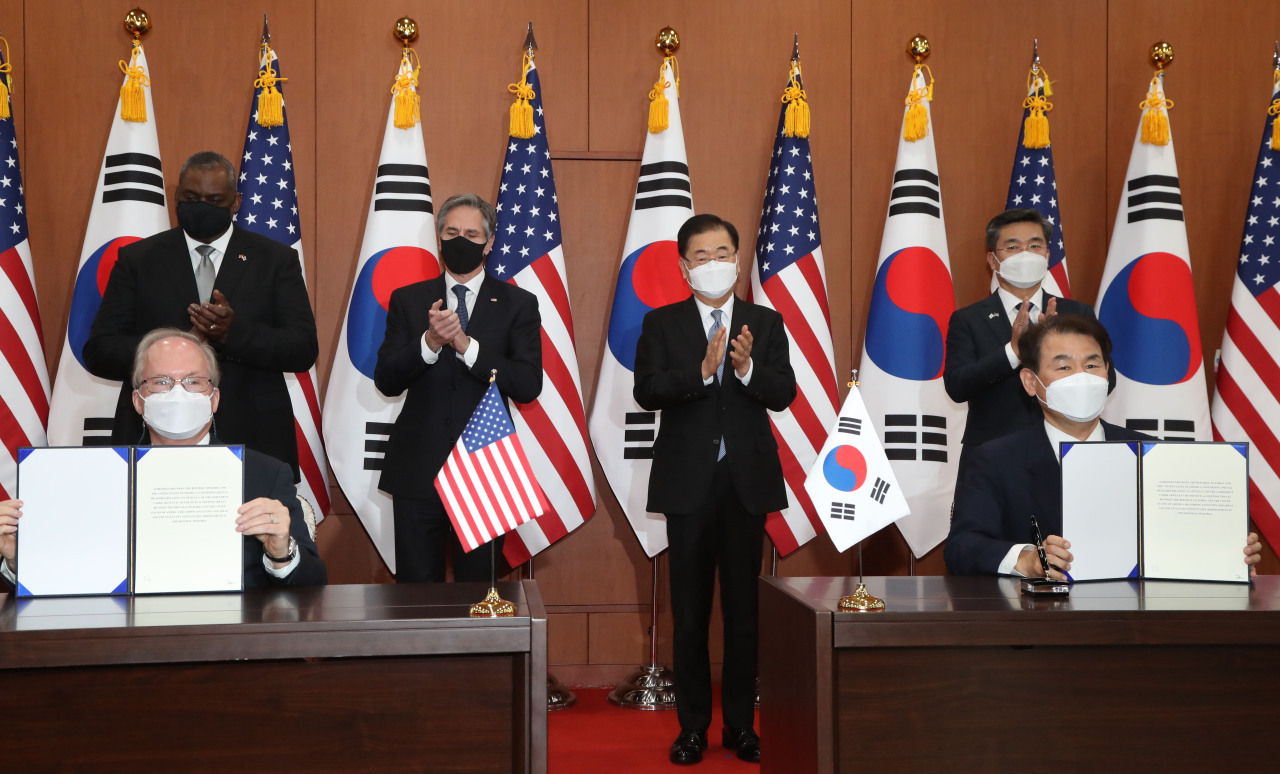Korea, US sign deal on troop costs after marathon talks
By Choi Si-youngPublished : March 18, 2021 - 17:43

South Korea and the US on Thursday signed an agreement that settled a protracted dispute over sharing the burden of supporting 28,500 US troops here, on the last day of the first in-person talks of their foreign and defense ministers in Seoul. The US state and defense secretaries flew here a day earlier.
Jeong Eun-bo, Seoul’s chief negotiator for the cost-sharing talks, and Rob Rapson, acting US ambassador to Korea, initialed the agreement as the two allies’ top envoys and defense chiefs hailed the accord as pivotal to their alliance and the combat readiness of their joint forces to keep North Korea in check.
The new Special Measures Agreement covers Seoul’s share of the costs until 2025, with this year’s contribution amounting to about $1.05 billion, a nearly 14 percent jump from the previous year. Seoul would have to shoulder an annual rise in costs commensurate with a yearly increase in its defense spending.
The two allies reached consensus after US President Joe Biden reversed the transactional approach of his predecessor, President Donald Trump, who demanded Korea shoulder a greater share of the burden that both sides later admitted had gone over the top. Talks started in September 2019.
Meanwhile, the two allies finished their biannual joint military drills that began Monday a week ago and expect to run them again in the summer.
The drills provide opportunities for Seoul to test its readiness to retake the wartime operational command from Washington, but they have differences over when the takeover should happen. The US and Korea do not see eye to eye on the arrangements, with Korea preferring an early transfer.
Secretary of State Lloyd Austin said it would take more time, though South Korean Defense Minister Suh Wook reiterated the commitment to negotiations to wrap up the takeover, hinting at sticking to the self-prescribed timeline where Seoul takes over the command within next year.
President Moon Jae-in, a vocal proponent of a self-reliant military, has promised to complete the transfer by May 2022, when he leaves office. Military watchers have dismissed the deadline as next to impossible, as the two allies are running out of time amid the discord over the issue.
By Choi Si-young (siyoungchoi@heraldcorp.com)
Jeong Eun-bo, Seoul’s chief negotiator for the cost-sharing talks, and Rob Rapson, acting US ambassador to Korea, initialed the agreement as the two allies’ top envoys and defense chiefs hailed the accord as pivotal to their alliance and the combat readiness of their joint forces to keep North Korea in check.
The new Special Measures Agreement covers Seoul’s share of the costs until 2025, with this year’s contribution amounting to about $1.05 billion, a nearly 14 percent jump from the previous year. Seoul would have to shoulder an annual rise in costs commensurate with a yearly increase in its defense spending.
The two allies reached consensus after US President Joe Biden reversed the transactional approach of his predecessor, President Donald Trump, who demanded Korea shoulder a greater share of the burden that both sides later admitted had gone over the top. Talks started in September 2019.
Meanwhile, the two allies finished their biannual joint military drills that began Monday a week ago and expect to run them again in the summer.
The drills provide opportunities for Seoul to test its readiness to retake the wartime operational command from Washington, but they have differences over when the takeover should happen. The US and Korea do not see eye to eye on the arrangements, with Korea preferring an early transfer.
Secretary of State Lloyd Austin said it would take more time, though South Korean Defense Minister Suh Wook reiterated the commitment to negotiations to wrap up the takeover, hinting at sticking to the self-prescribed timeline where Seoul takes over the command within next year.
President Moon Jae-in, a vocal proponent of a self-reliant military, has promised to complete the transfer by May 2022, when he leaves office. Military watchers have dismissed the deadline as next to impossible, as the two allies are running out of time amid the discord over the issue.
By Choi Si-young (siyoungchoi@heraldcorp.com)
-
Articles by Choi Si-young







![[KH Explains] How should Korea adjust its trade defenses against Chinese EVs?](http://res.heraldm.com/phpwas/restmb_idxmake.php?idx=644&simg=/content/image/2024/04/15/20240415050562_0.jpg&u=20240415144419)











![[Today’s K-pop] Stray Kids to return soon: report](http://res.heraldm.com/phpwas/restmb_idxmake.php?idx=642&simg=/content/image/2024/04/16/20240416050713_0.jpg&u=)